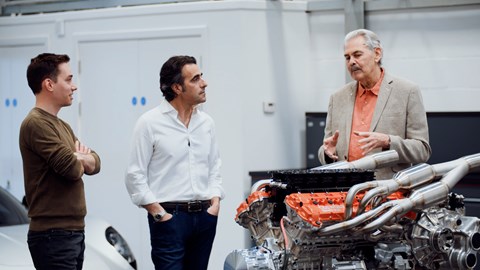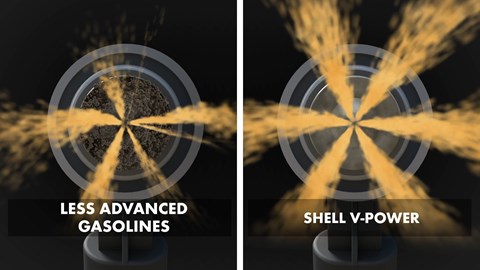► 3.9-litre Cosworth GMA V12 produces 662bhp
► Shell V-Power fuels the T.50 – see it in our video
► Optimum performance for cars old and new
PROMOTIONAL POST In association with Shell V-Power

Professor Gordon Murray CBE is responsible for some of the greatest racing and road cars of all time. From the iconic F1 to the dominant MP4/4 Formula 1 car, he’s often referred to as one of the greatest automotive designers ever. And yet, even from the humble beginnings of building his own racing car at the age of 17 in 1964, Shell has been there every step of the way from the (IGM Ford) T.1 to the T.50 – potentially one of the greatest V12-engined road cars.
‘I was desperate to go motor racing but, as was usually the case with youngsters in the 60s, I had no money so I had to design and build my own car,’ Gordon explains. After building the super lightweight T.1 over a period of two years, he raced it in ’67 and ’68 proudly displaying the Shell logo. Having built the engine and crafted components like the pistons and camshaft himself, Shell supplied the Avgas (aviation fuel) in exchange for running the company’s famous logo on the side of the car.
Fast forward almost 60 years and, while the engines Gordon uses have changed, Shell remains a recurring presence. The T.50’s 3.9-litre naturally aspirated Cosworth GMA V12 engine produces an astonishing 662bhp at 11,000rpm and revs to 12,100rpm, a peak far higher than any other production car on sale today.
Gordon’s obsession with lightweight design and precision is the exact reason the T.50’s engine weighs just 178kg (making it the world’s lightest naturally aspirated road-going V12) and produces one of the greatest engine sounds ever created – watch our video to hear the supercar chase its heady redline. In short, the V12 is a technological masterpiece and it wouldn’t be possible without Shell V-Power.
 The T.50 and its amazing V12 – plus its V12 sister cars in Gordon Murray Automotive’s line-up
The T.50 and its amazing V12 – plus its V12 sister cars in Gordon Murray Automotive’s line-up
Gordon explains: ‘I’ve worked with high-performance engines all my life but this V12, from a naturally aspirated road car point of view, is the most extreme engine in the world. And because it has the highest compression ratio, the highest revs, the highest and fastest response time, we need the best fuel available.’ High praise, but Shell’s ability to produce the finest quality fuel is born out of years of experience at the cutting edge, as well as technical partnerships with the world’s greatest performance car makers.
In addition to working with Gordon Murray Automotive, Shell’s association with BMW Motorsport and Scuderia Ferrari allows it to develop its fuels at the highest levels of motorsport with an unrivalled R&D platform at its fingertips. Indeed, 99 per cent of the same types of compounds found in Shell V-Power race fuel supplied to Scuderia Ferrari are shared with the Shell V-Power you’ll find at your local forecourt.
 Gordon Murray and Dario Franchitti discuss the V12 with CAR’s James Dennison in our video
Gordon Murray and Dario Franchitti discuss the V12 with CAR’s James Dennison in our video
However, while the T.50 is a great demonstration of the performance potential available with Shell V-Power, what impact does it have on the cars that most of us drive around in everyday? Does Shell V-Power deliver any benefit to your petrol hatchback or diesel SUV?
To help answer the question, we view three different inlet valves from port fuel injection petrol engines, each one with varying amounts of carbon deposit build-up on the surface. This occurs because the valves are hot and when fuel and air pass over, a build-up of performance-robbing deposits occurs. However, as Jo Smith – one of Shell’s fuel scientists – explains, Shell V-Power can help reduce this build-up and stop it occurring in the first place.
 Shell’s Jo Smith shows us how carbon deposits can build-up on engine parts
Shell’s Jo Smith shows us how carbon deposits can build-up on engine parts
‘The latest generation of new and improved Shell V-Power has been developed by our global team of scientists and engineers. The cleaning technology that we have in our Shell V-Power can control and remove up to 100 per cent of those harmful deposits which then helps the engine run as it was designed to. We can restore and help to rejuvenate the performance of older engines and newer engines and take them back to like new.’
It’s the same story with direct fuel injection engines, where deposits can form on the fuel injector tip and start to block the fuel injector holes – this can impact on how the fuel is sprayed into the combustion chamber resulting in non-optimum combustion. Here, Shell V-Power can remove up to 100 per cent of those deposits and therefore help to maintain the ideal fuel injection, thus delivering optimum combustion.

Overall, the message is clear. Shell’s know-how and experience with the highest level of performance engines allows groundbreaking projects such as the T.50’s Cosworth GMA V12 engine to exist, yet there’s also benefits to everyday cars. By using new and improved Shell V-Power for petrol and diesel vehicles, not only does it help to maximise performance but also improves your engine’s fuel economy.
Actual effects and benefits may vary according to vehicle type, vehicle age, vehicle condition and driving style. No guarantees provided. See shell.co.uk/vpower for more information.